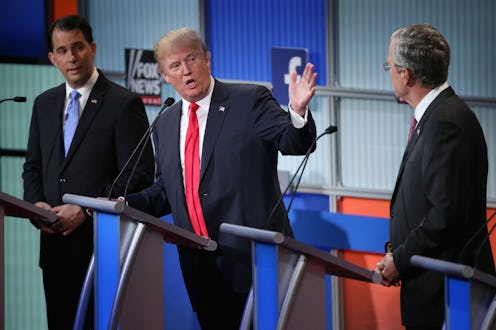News
Why The Loyalty Pledge Is A Big Deal To The RNC
The Republican National Committee on Wednesday asked all GOP presidential candidates to sign a pledge assuring the committee that they will not try to take on a third-party bid, according to the Associated Press. Why is the GOP asking candidates to pledge against a third-party bid? Two words, or, rather, one name: Donald Trump.
Even though Trump is leading in early polls, he repeatedly threatened to launch a third-party bid if he didn't get the Republican nomination, according to the Associated Press. In July, Trump did an exclusive interview with The Hill where he said "so many people" want him to make a third-party bid if he doesn't win the nomination. He said he would have to see how he is treated by Republicans, and if the party is not being "fair" then he would absolutely consider a third-party run. But a third-party run for Trump would make it almost impossible for the Republican Party to win the White House in 2016, according to the Associated Press.
"The RNC has not been supportive," Trump told the Hill. "They were always supportive when I was a contributor. I was their fair-haired boy. The RNC has been, I think, very foolish.”
A close associate to Trump told Politico that Trump plans to sign the loyalty pledge to avoid complications with getting listed on primary ballots. Some states have said that they would not list a third-party candidate on their ballots in the primary. Trump's associate also said Trump will sign the pledge to avoid being attacked or removed from the next Republican debate.
The RNC has scolded Trump a number of times for his abrasive comments about Mexican immigrants and when he said that John McCain was not a war hero, according to Talking Points Memo. Trump and RNC chairman Reince Priebus plan to meet Thursday in New York, a Trump spokeswoman told The Washington Post, and Trump has scheduled a 2 p.m. news conference where he will probably talk about the pledge. In addition to requiring candidates to promise not to make a third-party bid, the pledge also asks that they promise they will support whomever the RNC chooses as its nominee, according to the Post, which obtained a copy of the document:
I [name] affirm that if I do not win the 2016 Republican nomination for president of the United States I will endorse the 2016 Republican presidential nominee regardless of who it is. I further pledge that I will not seek to run as an independent or write-in candidate nor will I seek or accept the nomination for president of any other party.
Prior to the RNC's pledge, only Trump has said that he would not support the party's nominee if it were not himself. Now, Republican candidate and Ohio Gov. John Kasich has formally said he will sign the pledge. Rand Paul and Chris Christie have both signed the pledge. Former RNC chairman and 2016 candidate Jim Gilmore has also said he supports the party's push for the candidates' loyalty, according to the Post:
If someone is going to go to the party and ask for their support, if they’re going to ask the rank and file for their vote, that comes with an obligation for loyalty, in my mind. Generally speaking, if you want the party’s support, that loyalty should be there.
Though Trump's associate said Trump will sign the pledge, sources told CNN that Trump is unpredictable and could change his mind depending on how his conversation with Priebus goes.
